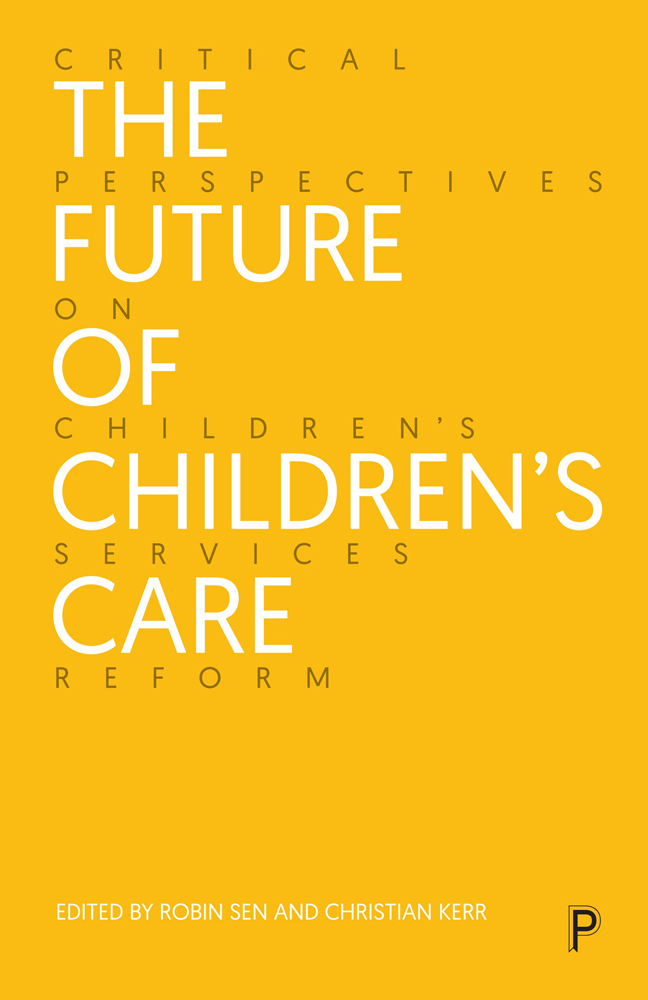Book contents
- Frontmatter
- Dedication
- Contents
- Notes on contributors
- Acknowledgements
- Foreword
- 1 Introduction: critical perspectives on children’s services reform
- 2 Where now? Children's rights in England into the 2020s
- 3 More of memes than schemes: networked propagation in children's social care
- 4 Reclaiming social work, the social work complex and issues of bias in children's services
- 5 Humane social work practice: a more parent friendly system? Hopes and challenges in the 2020s
- 6 Exploring and re-imagining children's services in England through a decolonial frame
- 7 Kinship care for England and Wales in the 2020s: assumptions, challenges and opportunities
- 8 If adoption is the answer, what was the question?
- 9 Caring for children and young people in state care in the 2020s
- 10 Protecting children: a social model for the 2020s
- 11 Conclusion: children's services reform looking back and forwards
- Index
6 - Exploring and re-imagining children's services in England through a decolonial frame
Published online by Cambridge University Press: 23 January 2024
- Frontmatter
- Dedication
- Contents
- Notes on contributors
- Acknowledgements
- Foreword
- 1 Introduction: critical perspectives on children’s services reform
- 2 Where now? Children's rights in England into the 2020s
- 3 More of memes than schemes: networked propagation in children's social care
- 4 Reclaiming social work, the social work complex and issues of bias in children's services
- 5 Humane social work practice: a more parent friendly system? Hopes and challenges in the 2020s
- 6 Exploring and re-imagining children's services in England through a decolonial frame
- 7 Kinship care for England and Wales in the 2020s: assumptions, challenges and opportunities
- 8 If adoption is the answer, what was the question?
- 9 Caring for children and young people in state care in the 2020s
- 10 Protecting children: a social model for the 2020s
- 11 Conclusion: children's services reform looking back and forwards
- Index
Summary
Introduction
This chapter identifies significant issues connected to race and children's services, explores the gaps in their coverage in the MacAlister Review and advocates for them to be better addressed going forward. After outlining the framework for our approach, we analyse the coverage and omissions on race in the MacAlister Review and illustrate how these omissions are not accidental but arise from an unwillingness to criticise current government policies and practices. We draw on the case of ‘Child Q’ to exemplify concerns about adultification before suggesting ways forward for children's services.
Salient matters concerning race and children's services in England include the over-representation of some groups of racially minoritised children in state care and the criminal justice system; the adultification of racially minoritised children, particularly Black children; harsh professional judgements of, and a lack of support for, Black families; the under-representation of racially minoritised practitioners in senior management positions in children's services; and, the treatment of unaccompanied asylum-seeking children. While there is not space to do justice to all of these here, the underlying themes identified are of relevance to each.
Our analysis is influenced by an intersectional and decolonial approach to critical race theory. Core aspects of our approach are the belief that for many racially minoritised families racism is not an exception but a regular experience, which can go unnoticed by those who are not subject to it (Kolivoski et al, 2014; Delgado and Stefancic, 2017). It also holds that lived experiences of racism are influenced by a range of other social identities a person holds, notably gender and class (Crenshaw, 1989, 1991), but also often less well considered factors such as migration status and experiences of colonialism (Mehrotra, 2010). The experience of any person receiving a social work service will be influenced by a complex and fluid interplay of such social identities (Bernard, 2021) and it is therefore essential to explore linkages between such identities and underlying structural and power inequalities (Valentine, 2007). Third, our approach emphasises the importance of centring the experiences of those subject to racism (Mehrotra, 2010; Delgado and Stefancic, 2017). Finally, we use a decolonial frame to highlight the legacy of colonialism on contemporary expressions of racism, and to seek to move beyond these framings in our understandings (Harms Smith and Rasool, 2020).
A note on terminology.
- Type
- Chapter
- Information
- The Future of Children's CareCritical Perspectives on Children's Services Reform, pp. 101 - 121Publisher: Bristol University PressPrint publication year: 2023

